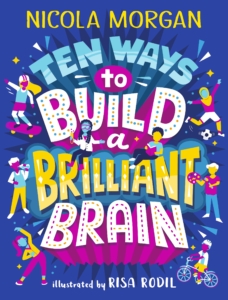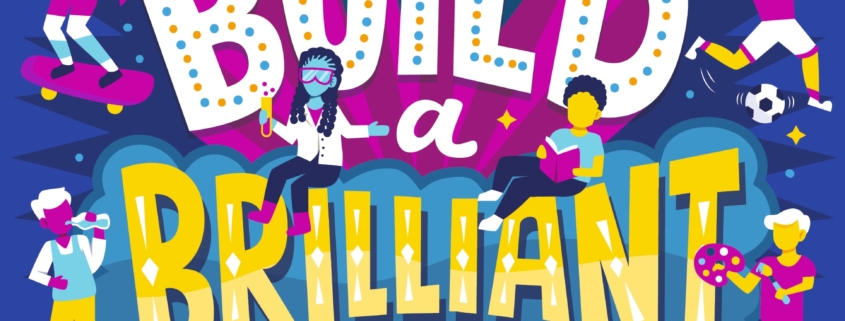
Building a brilliant brain is not all hard work, as you’ll learn in Ten Ways to Build a Brilliant Brain. In fact, it’s rarely hard work at all – just a matter of understanding something about what your brain likes and needs and making good choices as often as possible. Your brain is a bit like a puppy: it’s eager to get into everything and responds best to kindness, firmness and rewards. But people can make big mistakes with a puppy, resulting in a creature that causes havoc and stress wherever it goes! Ten Ways to Build a Brilliant Brain trains you to train your brain and let it fulfil its potential and behave brilliantly.
On the one hand, the brain is easy to reward: it seeks rewards all by itself. Left to its own devices, it would do continuously seek pleasure, from food (especially sugar), from alcohol, from sex, from excitement, from anything that made it (you) feel good. Clearly, therefore, we really shouldn’t leave it to its own devices. Or at least not the pleasure and reward centre on its own: we need to make sure the sensible, controlled prefrontal cortex is in charge, choosing rewards that will not bring negative consequences such as addiction, excess weight gain, and any mental or physical illness.
Let me offer ten ways to offer your brain the positive rewards it craves but also which will do it good, not just immediately but also in the long term. I suggest you do each of these things at least once a day. Now there’s a challenge!
1. Read for pleasure – of course! We know (see my website research section for all the evidence a sceptic might need) that R4P has so many benefits. One of them is its proven power to de-stress. The main reason is that when we’re engrossed in a book we can’t simultaneously be ruminating on our worries. I even have a word – readaxation – for this stress-busting effect. You’ll find resources and details on my website.
2. Laugh – the most highly-paid piece of writing I ever did was in about 1984 when I was paid £50 for a tiny paragraph for Reader’s Digest in a regular section called Laughter is the Best Medicine. When we laugh – or even smile – our facial muscles trigger the brain to produce endorphins, our natural ‘happy chemicals’. This reduces pain – both physical and mental. If you don’t feel like laughing, watch one of your favourite YouTube videos. Try ‘goats screaming like humans’, ‘babies eating lemons’, ‘reasons my cat/toddler is annoyed’…
3. Stop for fuel – our brain needs and loves food and drink. Let’s focus on the ones that make a genuinely healthyreward. Here are three ideas, but you can bring your own to the table: A) Something savoury (but not too salty) – maybe cream cheese on oatcakes, a hummus dip, a cheese and salad sandwich, sardine mashed on wholegrain toast. B) Something fruity – fresh or dried fruit plus a handful of nuts or maybe a yogurt. C) Something liquid – not fizzy, caffeinated or alcohol(sorry!), but maybe a milkshake, smoothie, or glass of iced water with slices of lemon, orange, other fruit, mint.
4. Ring the changes – our brain loves a change of pace or focus; if we just stay working on one type of task, our brain switches off and we perform less well. So mixing up the day our work session with different types of task is something that our brain responds well to. Even if it’s another task, the brain can still interpret it as a reward. Yes, you can reward your brain with more work! Careful, though: tiredness is neither a desired outcome nor rewarding.
5. Physical activity – and can we please stop calling it “exercise” as that is off-putting for many? Physical activity is about moving our body in whatever way wecan. Yes, getting off our seat is really important if we are able to do that but what our brain really wants is just for us to move. Physical activity is good for body, brain, mood and mental health. You might feel the reward while you’re doing it but you’ll certainly feel it afterwards. Physical activity also releases endorphins. Finding an activity you can do regularly is the single best thing you can do to reward your brain.
6. Be social – humans are wired to be social, even those of us who also love spending time on our own (See next point.) Not having friends or a support network, or being excluded from social connection, is seriously bad for mental health and can even be bad for physical health – loneliness risks illness. For this protective reason, our brains are wired to build connections and we get reward when we do. It’s OK to spend time relaxing alone but don’t neglect friendships. Message a friend now and suggest getting together – your brain will love it.
7. Nourish your introversion or extroversion – we all fall somewhere on the introvert-extrovert scale and we can sometimes feel more one than the other. Introverts are often made to feel inadequate: we’re told to join in moreand are expected to enjoy collaborative work, group activities, team sport. But lots of people do their best work and have their most brilliant and useful ideas when allowed to be alone and introverts suffer from too much interaction. There are equal strengths in both modes of operation. Whether you crave time alone or time with others, recognise this need and feed it whenever you need it.
8. Feed your curiosity – another way human brains are wired is to be curious. Without our desire to discover, invent, create, we’d never answer the question ‘what would happen if…?’ and the human race would not have progressed from caves. So, our brains feel rewarded by discovery, by learning or trying new things. Reward yours by learning a new word or weird fact, trying a new recipe, listening to a different style of music, going to a museum or exhibition.
9. Allow mental composting – our brain simply cannot continue to absorb information and expect it to be processed into long-term memory if we don’t have regular breaks in input. After time spent taking in information – for example in reading or listening – if we go straight to another high-concentration task, the first information isn’t processed properly and the second lots of information doesn’t have anywhere to go. So, after doing any kind of mental work, we then need to engage our ‘default mode network’, to allow what I call mental composting to happen and the information to become fully processed, understood and moved into the potential for long-term recall. The default mode network is active when we do activities which use minimal amounts of brain bandwidth: walking in a familiar place, sitting looking out of the window, ironing, simple housework (get dusting!). It’s during these ties that people get idea and have flashes of insight and inspiration. The trouble is that nowadays we are far too likely to open our phone and start scrolling – this is not default mode working. So, put your phone away and let your mind wander.
10. Breathe right – this is the most important relaxation strategy so I’ve left it till last. Breathing is something we do all the time, so how can it be rewarding, you ask? Butmany of us spend most of our waking days breathing in a shallow, unrelaxed way. “Breathwork” is an essential tool in reducing stress and anxiety levels. And the effect is pretty instant so not only is it rewarding but the benefits are immediate. It’s free, simple and healthy. What more could we want?
How do you do it? There are lots of methods but they all involve: making your breathing a) slower b) lower – using your belly more than your upper chest and c) more conscious. See my website for some methods or internet search “belly-breathing” or “relaxed breathing”. Actively relax your breathing in this way several times a day and any time you feel anxious or stress.
There you have my ten healthy ways to reward your brilliant brain. However, careful with that word ‘reward’ as it implies something you should only do when you ‘deserve’ it and some people don’t think they ‘deserve’ reward until they’ve ‘succeeded’ at something and their work is done. This is fundamentally wrong. Your brain and body need these ten actions, every day, several times a day if possible. Your brain won’t just feel better but do better. And we all want our brains to do brilliantly for us.
Nicola Morgan, aka The Teenage Brain Woman, is an award-winning author and speaker on many areas of well-being and learning. Her best-selling examination of the teenage brain, Blame My Brain, was shortlisted for the Aventis Prize; the prize-winning Teenage Guide to Stress, along with The Teenage Guide to Friends, Positively Teenage, Life Online, Body Brilliant, The Awesome Power of Sleep and Be Resilient, underline Nicola’s unparalleled expertise. In 2018, she was awarded the SLA’s prestigious award for Outstanding Contribution to Information Books. She used to be a teenage novelist and one day will be again. Her new book is TEN WAYS TO BUILD A BRILLIANT BRAIN, published by Walker Books. www.nicolamorgan.com
Views expressed do not necessarily reflect those of the Federation.





